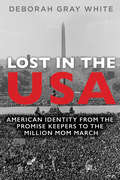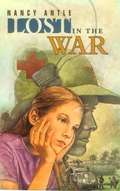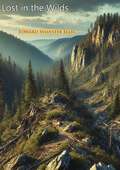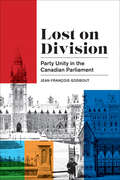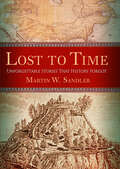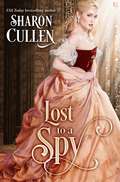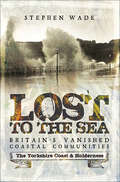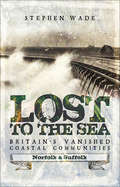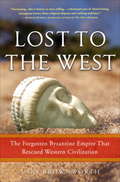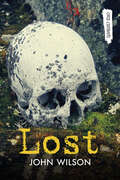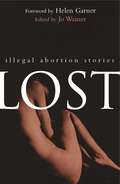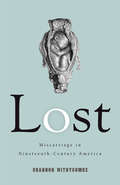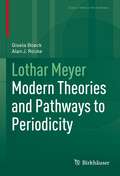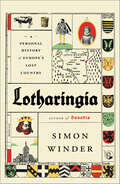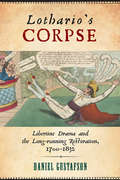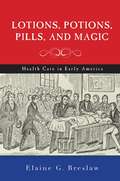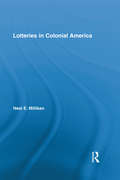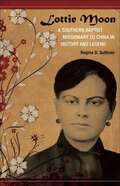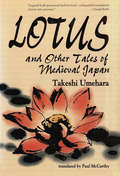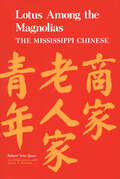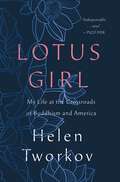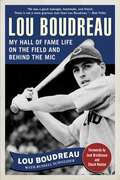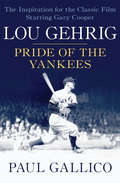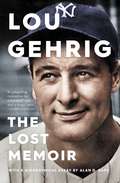- Table View
- List View
Lost in the USA: American Identity from the Promise Keepers to the Million Mom March (Women, Gender, and Sexuality in American History)
by Deborah Gray WhiteRemembered as an era of peace and prosperity, turn-of-the-millennium America was also a time of mass protest. But the political demands of the marchers seemed secondary to an urgent desire for renewal and restoration felt by people from all walks of life. Drawing on thousands of personal testimonies, Deborah Gray White explores how Americans sought better ways of living in, and dealing with, a rapidly changing world. From the Million Man, Million Woman, and Million Mom Marches to the Promise Keepers and LGBT protests, White reveals a people lost in their own country. Mass gatherings offered a chance to bond with like-minded others against a relentless tide of loneliness and isolation. By participating, individuals opened a door to self-discovery that energized their quests for order, autonomy, personal meaning, and fellowship in a society that seemed hostile to such deeper human needs. Moving forward in time, White also shows what marchers found out about themselves and those gathered around them. The result is an eye-opening reconsideration of a defining time in contemporary America.
Lost in the War
by Nancy AntleTwelve-year-old Lisa Grey struggles to cope with a mother whose traumatic experiences as a nurse in Vietnam during the war are still haunting her.
Lost in the Wilds
by Edward Sylvester EllisIn "Lost in the Wilds," Edward Sylvester Ellis weaves a gripping tale of adventure, survival, and self-discovery in the unforgiving wilderness. Set against the backdrop of the untamed American frontier, this timeless novel captures the essence of human resilience and the relentless spirit of exploration.The story follows young protagonists who find themselves stranded in the wild after a series of unforeseen events. Facing the daunting challenges of nature, they must rely on their wits, courage, and the invaluable lessons of their upbringing to navigate the perilous terrain. As they encounter wild animals, treacherous landscapes, and unpredictable weather, their journey becomes a profound test of endurance and ingenuity.Ellis's masterful storytelling brings the wilderness to life with vivid descriptions and a deep appreciation for the natural world. His characters are richly drawn, each grappling with their fears and doubts while discovering hidden strengths and forging unbreakable bonds. The narrative deftly balances thrilling action with moments of introspection, allowing readers to connect with the characters on a deeply emotional level."Lost in the Wilds" is more than just an adventure story; it is a celebration of the human spirit's capacity to overcome adversity. Through the trials and triumphs of his characters, Ellis explores themes of friendship, perseverance, and the transformative power of nature. His keen observations and heartfelt prose resonate with readers of all ages, making this book a cherished classic in the genre of wilderness adventure.As the young adventurers navigate their way back to safety, they learn invaluable life lessons that shape their character and worldview. Ellis's narrative serves as a poignant reminder of the importance of resilience, resourcefulness, and the enduring human connection to the natural world.Whether you are an avid outdoors enthusiast or simply a lover of captivating storytelling, "Lost in the Wilds" offers a compelling and inspirational read. Edward Sylvester Ellis's timeless tale of survival and discovery continues to enchant and inspire readers, reaffirming the boundless potential of the human spirit.
Lost on Division: Party Unity in the Canadian Parliament (Political Development: Comparative Perspectives)
by Jean-François GodboutCompared to other countries, Canada’s Parliament shows a high level of party unity when it comes to legislative voting. This was not always the case, however. One hundred years ago, this sort of party discipline was not as evident, leading scholars to wonder what explains the growing influence of political parties in the Canadian Parliament. In Lost on Division, Jean-François Godbout analyses more than two million individual votes recorded in the House of Commons and the Senate since Confederation, demonstrating that the increase in partisanship is linked to changes in the content of the legislative agenda, itself a product of more restrictive parliamentary rules instituted after 1900. These rules reduced the independence of private members, polarized voting along partisan lines, and undermined Parliament’s ability to represent distinct regional interests, resulting in – among other things – the rise of third parties. Bridging the scholarship on party politics, legislatures, and elections, Lost on Division builds a powerful case for bringing institutions back into our understanding of how party systems change. It represents a significant contribution to legislative studies, the political development literature, and the comparative study of parliaments.
Lost to Time: Unforgettable Stories That History Forgot
by Martin W. SandlerStories that history forgot…but readers will remember“The only thing new in the world,” said Harry S. Truman, “is the history you dont know.” In this fresh and fascinating collection of historical vignettes, Martin W. Sandler (author of Resolute and Atlantic Ocean) restores to memory important events, people, and developments that have been lost to time. Though barely known today, these are major historical stories, from Ziryab, an eighth-century black slave whose influence on music, cuisine, fashion, and manners still reverberates, to Cahokia, a 12th century city north of the Rio Grande, which at its zenith contained a population estimated to have been as high as 40,000 (more than any contemporary European city), to the worst peacetime maritime disaster ever, the explosion and sinking of the Sultana on the Mississippi in 1865.These tales are far from trivia; they illuminate little-known American and foreign achievements, ingenuity, heroics, blunders, and tragedies that changed the course of history and resonate today.
Lost to a Spy: An All the Queen's Spies Novel (All the Queen's Spies #3)
by Sharon CullenA refined Scottish courtier. A rugged British spy. And an affair that will change the course of history. Everything changes when the shocking deception is revealed in this seductive novel from USA Today bestselling author Sharon Cullen. Ladies in waiting can’t help noticing more than they let on. After so many years at the court of Mary, Queen of Scots, Emma Howard sees quite plainly that the royal couple is anything but happy. Reeling from a failed marriage herself, Emma sympathizes with her beloved queen. But the last thing she wants is for the king to be murdered, let alone to witness the shocking act herself. With her whole world turned upside-down, Emma is saved by the quick thinking of a lowly printer . . . who, unbeknownst to her, is one of England’s most daring spies. At Queen Elizabeth’s behest, Tristan has been stirring discontent against the Scottish nobility. Now that the king is dead, his mission is even more critical. There’s only one complication: the exquisite courtier who’s unexpectedly fallen under Tristan’s protection. Emma rouses his body and his soul. But after she learns that he’s a traitor, the fate of two nations hangs on her response. Tristan’s prepared to risk his life in exchange for hers. Will Emma do the same for the man she’s come to love? Don’t miss these novels in the All the Queen’s Spies series: WED TO A SPY | BOUND TO A SPY And look for all of Sharon Cullen’s delightful historical romances: THE NOTORIOUS LADY ANNE | LOVING THE EARL | PLEASING THE PIRATE | HIS SAVING GRACE | SEBASTIAN’S LADY SPY | THE RELUCTANT DUCHESS The Highland Pride series: SUTHERLAND’S SECRET | MACLEAN’S PASSION | CAMPBELL’S REDEMPTION This ebook includes an excerpt from another Loveswept title.
Lost to the Sea, Britain's Vanished Coastal Communities: Britain's Vanished Coastal Communities: The Yorkshire Coast And Holderness
by Stephen WadeOnce there was a Roman settlement on what is now Filey Brig. In Holderness, a prosperous town called Ravenser saw kings and princes on its soil, and its progress threatened the good people of Grimsby. But the Romans and the Ravenser folk are long gone, as are their streets and buildings sunk beneath the hungry waves of what was once the German Ocean.Lost to the Sea: The Yorkshire Coast & Holderness tells the story of the small towns and villages that were swallowed up by the North Sea. Old maps show an alarming number of such places that no longer exist. Over the centuries, since prehistoric times, people who settled along this stretch have faced the constant and unstoppable hunger of the waves, as the Yorkshire coastline has gradually been eaten away. County directories of a century ago lament the loss of communities once included in their listings; cliffs once seeming so strong have steadily crumbled into the water. In the midst of this, people have tried to live and prosper through work and play, always aware that their great enemy, the relentless sea, is facing them. As the East Coast has lost land, the mud flats around parts of Spurn, at the mouth of the Humber, have grown. Stephen Wades book tells the history of that vast land of Holderness as well, which the poet Philip Larkin called the end of land.
Lost to the Sea, Britain's Vanished Coastal Communities: Norfolk and Suffolk
by Stephen WadeLost to the Sea: Norfolk & Suffolk relates the stories of how the human communities along the coast of these counties maintained their struggle with the sea. From very early Neolithic times, when global changes created the Continental Shelf and raised the cliffs along Britain's eastern shorelines, through Roman and medieval times, the first villages and towns were gradually established, only to be faced with the problem of the sea's incursions onto agricultural land. In the 1950s, Rowland Parker's classic study of Dunwich, a key town of Suffolk engulfed, set the scene for a long-standing interest in how the sea's challenge has been met. There have been successes and failures, and Stephen Wade tells the story of the seaside holiday towns and fishing communities that have had to struggle for survival.In this book, the reader will find stories of the people involved in this titanic effort through the centuries. The narrative moves down the coast from Hunstanton to Southwold, tracing the losses and the gains, not only in measurements of land, but in the tough human experience of that environmental history.
Lost to the West: The Forgotten Byzantine Empire That Rescued Western Civilization
by Lars BrownworthFilled with unforgettable stories of emperors, generals, and religious patriarchs, as well as fascinating glimpses into the life of the ordinary citizen, Lost to the West reveals how much we owe to the Byzantine Empire that was the equal of any in its achievements, appetites, and enduring legacy. For more than a millennium, Byzantium reigned as the glittering seat of Christian civilization. When Europe fell into the Dark Ages, Byzantium held fast against Muslim expansion, keeping Christianity alive. Streams of wealth flowed into Constantinople, making possible unprecedented wonders of art and architecture. And the emperors who ruled Byzantium enacted a saga of political intrigue and conquest as astonishing as anything in recorded history. Lost to the West is replete with stories of assassination, mass mutilation and execution, sexual scheming, ruthless grasping for power, and clashing armies that soaked battlefields with the blood of slain warriors numbering in the tens of thousands.From the Hardcover edition.
Lost: Books V And Vi (Orca Currents)
by John WilsonSam and Annabel are pleased when they are selected to take a cruise to the Arctic. They are thrilled when they learn that the cruise will take them past a site connected to the most famous mystery in Arctic history: the Franklin Expedition. But things on the cruise are not what they seem. When Sam and Annabel make a startling discovery on a small island close to where archaeologists are diving on the wreck of the Erebus, one of the Franklin’s ships, they are confronted by an old enemy. Isolated and outnumbered, how can they possibly save the priceless artifact that may hold the answer to the Franklin mystery? This short novel is a high-interest, low-reading level book for middle-grade readers who are building reading skills, want a quick read or say they don’t like to read! The epub edition of this title is fully accessible.
Lost: Illegal Abortion Stories
by Jo Wainer'It is chastening to read these bald tales, shockingly direct and unvarnished. Each story contains matter enough for a novel. Each one is a window onto a larger life, a broader world: a tantalising view of endlessly unfolding complexities.'-Helen Garner Twenty years ago, Dr Bertram Wainer, the abortion reform doctor and campaigner, placed an advertisement in a newspaper asking women who had illegal abortions to come forward to tell their stories. Their personal testimonies and the accounts from doctors and nurses are published for the first time in this collection. Women had to draw on deep reservoirs of courage and determination faced with the fear of illegal abortion. This collection tells of some of those acts of courage and the difficulties society placed in women's way. Moving and candid, these stories uncover the hidden history of abortion in Australia.
Lost: Miscarriage in Nineteenth-Century America (Critical Issues in Health and Medicine)
by Shannon WithycombeIn Lost, medical historian Shannon Withycombe weaves together women’s personal writings and doctors’ publications from the 1820s through the 1910s to investigate the transformative changes in how Americans conceptualized pregnancy, understood miscarriage, and interpreted fetal tissue over the course of the nineteenth century. Withycombe’s pathbreaking research reveals how Americans construed, and continue to understand, miscarriage within a context of reproductive desires, expectations, and abilities. This is the first book to utilize women’s own writings about miscarriage to explore the individual understandings of pregnancy loss and the multiple social and medical forces that helped to shape those perceptions. What emerges from Withycombe’s work is unlike most medicalization narratives.
Lothar Meyer: Modern Theories and Pathways to Periodicity (Classic Texts in the Sciences)
by Alan J. Rocke Gisela BoeckThis book provides an English translation of the early fundamental contributions of Lothar Meyer (1830-1895) regarding his independent discovery, coincident with that of Dmitrii Mendeleev, of the periodic system of the elements. Although an English translation of the 5th edition of Meyer´s book Modern Theories of Chemistry and their Significance for Chemical Statics was published in 1888, this will be the first time that these crucial early texts will be available in English. These writings reveal details regarding Meyer´s research pathway to the idea of periodicity and to an arrangement of the chemical elements in tables and graphs.An introductory commentary and interpolated editorial footnotes to the texts clarify the (physico)-chemical background regarding the various shifts in thought during the crucial period from 1860 to the early 1870s. A short biography of Lothar Meyer completes the book.The volume includes a complete translation of the first edition of Modern Theories of Chemistry and their Significance for Chemical Statics (1864), the ground-breaking paper “The Nature of the Chemical Elements as a Function of their Atomic Weights” in Annalen der Chemie und Pharmacie, suppl. vol. 7 (1870), 354-64, and portions of the revised second edition of Modern Theories of Chemistry and their Significance for Chemical Statics (1872).
Lotharingia: A Personal History of Europe's Lost Country
by Simon WinderFollowing Germania and Danubia, the third installment in Simon Winder’s personal history of EuropeIn 843 AD, the three surviving grandsons of the great emperor Charlemagne met at Verdun. After years of bitter squabbles over who would inherit the family land, they finally decided to divide the territory and go their separate ways. In a moment of staggering significance, one grandson inherited the area we now know as France, another Germany and the third received the piece in between: Lotharingia.Lotharingia is a history of in-between Europe. It is the story of a place between places. In this beguiling, hilarious and compelling book, Simon Winder retraces the various powers that have tried to overtake the land that stretches from the mouth of the Rhine to the Alps and the might of the peoples who have lived there for centuries.
Lothario's Corpse: Libertine Drama and the Long-Running Restoration, 1700-1832 (Transits: Literature, Thought & Culture 1650-1850)
by Daniel GustafsonLothario’s Corpse unearths a performance history, on and off the stage, of Restoration libertine drama in Britain’s eighteenth and early nineteenth centuries. While standard theater histories emphasize libertine drama’s gradual disappearance from the nation’s acting repertory following the dispersal of Stuart rule in 1688, Daniel Gustafson traces its persistent appeal for writers and performers wrestling with the powers of the emergent liberal subject and the tensions of that subject with sovereign absolutism. With its radical, absolutist characters and its scenarios of aristocratic license, Restoration libertine drama became a critical force with which to engage in debates about the liberty-loving British subject’s relation to key forms of liberal power and about the troubling allure of lawless sovereign power that lingers at the heart of the liberal imagination. Weaving together readings of a set of literary texts, theater anecdotes, political writings, and performances, Gustafson illustrates how the corpse of the Restoration stage libertine is revived in the period’s debates about liberty, sovereign desire, and the subject’s relation to modern forms of social control. Ultimately, Lothario’s Corpse suggests the “long-running” nature of Restoration theatrical culture, its revived and revised performances vital to what makes post-1688 Britain modern. Published by Bucknell University Press. Distributed worldwide by Rutgers University Press.
Lotions, Potions, Pills, and Magic: Health Care in Early America
by Elaine G. BreslawHealth in early America was generally good. The food was plentiful, the air and water were clean, and people tended to enjoy strong constitutions as a result of this environment. Practitioners of traditional forms of health care enjoyed high social status, and the cures they offered—from purging to mere palliatives—carried a powerful authority. Consequently, most American doctors felt little need to keep up with Europe’s medical advances relying heavily on their traditional depletion methods. However, in the years following the American Revolution as poverty increased and America’s water and air became more polluted, people grew sicker. Traditional medicine became increasingly ineffective. Instead, Americans sought out both older and newer forms of alternative medicine and people who embraced these methods: midwives, folk healers, Native American shamans, African obeahs and the new botanical and water cure advocates.In this overview of health and healing in early America, Elaine G. Breslaw describes the evolution of public health crises and solutions. Breslaw examines “ethnic borrowings” (of both disease and treatment) of early American medicine and the tension between trained doctors and the lay public. While orthodox medicine never fully lost its authority, Lotions, Potions, Pills, and Magic argues that their ascendance over other healers didn’t begin until the early twentieth century, as germ theory finally migrated from Europe to the United States and American medical education achieved professional standing.
Lotteries in Colonial America (Studies in American Popular History and Culture)
by Neal MillikanLotteries in Colonial America explores lotteries in England and the American colonies in the seventeenth and eighteenth centuries. From the founding of Jamestown to the financing of the American Revolution, lotteries played an important role in the economic life of the colonies. Lotteries provided an alternative form of raising money for colonial governments and a means of subsidizing public and private projects without enacting new taxes. The book also describes and analyzes the role of lotteries in the eighteenth-century consumer revolution, which transformed how buyers viewed the goods they purchased, or in the case of lotteries, won. As the middling classes in the colonies began to acquire objects that went beyond mere necessities, lotteries gave colonists an opportunity to risk a small sum in the hopes of gaining riches or valuable goods. Finally, the book examines how lotteries played a role in the changing notions of fortune in colonial America. Religion and chance were present in colonial lotteries as participants merged their own free will to purchase a lottery ticket with the will of the Christian God to select a winner.
Lottie Moon: A Southern Baptist Missionary to China in History and Legend (Southern Biography Series)
by Regina D. SullivanLegendary Southern Baptist missionary Charlotte "Lottie" Moon played a pivotal role in revolutionizing southern civil society. Her involvement in the establishment of the Women's Missionary Union provided white Baptist women with an alternate means of gaining and asserting power within the denomination's organizational structure and changed it forever. In Lottie Moon: A Southern Baptist Missionary to China in History and Legend Regina Sullivan provides the first comprehensive portrait of "Lottie," who not only empowered women but also inspired the formation of one of the most influential religious organizations in the United States.Despite being the daughter of slaveholders in antebellum Virginia, Moon never lived the life of a typical southern belle. Highly educated and influenced by models of independent womanhood, including an older sister who was a woman's rights advocate, an open opponent of slavery, and the first Virginian female to earn a medical degree, Moon followed her sister's lead and utilized her extensive education to successfully combine the language of woman's rights with the egalitarian impulse of evangelical Protestantism.In 1873 Moon found her true calling, however, in missionary work in China. During her tenure there she recommended that the week before Christmas be designated as a time of giving to foreign missions. In response to her vision, thousands of Southern Baptist women organized local missionary societies to collect funds, and in 1888, the Woman's Missionary Union was founded as the Southern Baptist Convention's female auxiliary for missionary work.Sullivan credits Moon's role in the establishment of the Woman's Missionary Union as having a significant impact on the erosion of patriarchal power and women's new engagement with the public sphere. Since her initial plea in 1888, the Missionary Union's annual "Lottie Moon Christmas Offering" has raised over a billion dollars to support missionary work.Lottie Moon captures the influence and culminating effect of one woman's personal, spiritual, and civic calling.
Lotus & Other Tales of Medieval Japan
by Paul Mccarthy Takeshi UmeharaThe medieval period in Japan, spanning the years from about 1200 to 1600, was a time of rapid cultural development that saw the emergence and refinement of many new art forms. One of these was the religious folk tale, or setsuwa, many collections of which were compiled during this time. Unlike the rarified court poems and accounts of aristocratic life written during this period, setsuwa were literature for the common man. Like the classic fables and parables of the West, these stories are varied in origin, many of them collected from Indian and Chinese sources and retold and embellished by succeeding generations of authors. In Lotus: and Other Tales of Medieval Japan, the author has carefully chosen eight particularly notable setsuwa for their timeless interest and fascinating plot developments.
Lotus & Other Tales of Medieval Japan
by Paul Mccarthy Takeshi UmeharaThe medieval period in Japan, spanning the years from about 1200 to 1600, was a time of rapid cultural development that saw the emergence and refinement of many new art forms. One of these was the religious folk tale, or setsuwa, many collections of which were compiled during this time. Unlike the rarified court poems and accounts of aristocratic life written during this period, setsuwa were literature for the common man. Like the classic fables and parables of the West, these stories are varied in origin, many of them collected from Indian and Chinese sources and retold and embellished by succeeding generations of authors. In Lotus: and Other Tales of Medieval Japan, the author has carefully chosen eight particularly notable setsuwa for their timeless interest and fascinating plot developments.
Lotus Among the Magnolias: The Mississippi Chinese
by Robert Seto QuanUnlike most Chinese-American studies which focus on large urban concentrations sustained by continuous immigration, this study centers on a small Chinese enclave located in a rural southern biracial society. It focuses upon three generations of Chinese undergoing social change in an area within the state of Mississippi known as the Delta. This isolated group of people, having little contact with other US Chinese communities, remained nearly intact through the first two generations. Now great changes have caused the third generation to leave the enclave and to relinquish many ethnic traditions. Lotus Among the Magnolias, a story recorded firsthand by a Chinese scholar who lived among the Mississippi Delta Chinese, is an ethnography about how the Chinese were initially classified by the whites as “colored,” and later came to be viewed as a people with a separate identity. As their image has changed, so too have many values and traditions in their lives. This study shows how these Chinese have been able to expand their social and economic potential and are now moving away from their restrictive beginnings.
Lotus Girl: My Life at the Crossroads of Buddhism and America
by Helen TworkovFrom one of the central figures in Buddhism's introduction to the West and the founder of Tricycle magazine comes a brilliant memoir of forging one’s own path that Pico Iyer calls "unflinching" and "indispensable." The daughter of an artist, Helen Tworkov grew up in the heady climate of the New York School of Abstract Expressionism; yet from an early age, she questioned the value of Western cultural norms. Her life was forever changed when she saw the iconic photo of Thich Quang Duc, the Vietnamese monk who, seated in meditation, set himself on fire to protest his government’s crackdown on the Buddhist clergy. Tworkov realized that radically different states of mind truly existed and were worth exploring. At the age of twenty-two, she set off for Japan, then traveled through Cambodia, India, and eventually to Tibetan refugee camps in Nepal. Set against the arresting cultural backdrop of the sixties and their legacy, this intimate self-portrait depicts Tworkov's search for a true home as she interacts with renowned artists and spiritual luminaries including the Dalai Lama, Pema Chödrön, Joseph Goldstein, Bernie Glassman, Charles Mingus, Elizabeth Murray and Richard Serra. Interweaving experience, research, and revelation, Helen Tworkov explores the relationship between Buddhist wisdom and American values, presenting a wholly unique look at the developing landscape of Buddhism in the West. Lotus Girl offers insight not only into Tworkov's own search for the truth, but into the ways each of us can better understand and transform ourselves.
Lou Boudreau: My Hall of Fame Life on the Field and Behind the Mic
by Russell Schneider Lou Boudreau Jack Brickhouse Chuck HeatonThe autobiography of a baseball great.Lou Boudreau is considered one of the most extraordinary men in baseball history. He was a player-manager, an All Star, an MVP, a World Series-winner, and a Hall of Famer. But that only scratches the surface of "The Good Kid.” In Lou Boudreau: Covering All the Bases, hear from his own words the personal story of a boy from Harvey, Illinois, and how he took the sport of baseball my storm.In 1942, at only twenty-four years of age and with less than three full seasons in the major leagues, Boudreau was named as the team’s next manager. He took the role seriously, and made sure to always lead by example. Lou also shares stories of playing with and managing Cleveland’s first African American players, Larry Doby and Satchel Paige, and of winning the 1944 American League Batting Championship with a hit in his final at bat of the season. But the highlight of Lou’s career came in 1948, when he used his bat, glove, and coaching skills to lead the Indians to a World Series victory, while becoming the only player-manager ever to win the American League MVP award.Retiring as a ballplayer in 1952, Boudreau coached for eight more seasons before finally walking away from the field in 1960. He then began his second career as a broadcaster, and was the "Voice of the Chicago Cubs” for almost thirty years.On August 10, 2001, Lou Boudreau passed away at the age of eighty-four. Enshrined in the National Baseball Hall of Fame, "The Good Kid” will always be remembered for what he did both on and off the field. As former teammate and Hall of Famer Bob Feller once said, "He was a great manager, teammate, and friend. There is not a more gracious man than Lou Boudreau.”
Lou Gehrig: Pride of the Yankees
by Paul GallicoA touching tribute to one of the greatest ballplayers of all time For seventeen seasons, Lou Gehrig was the heart and soul of the New York Yankees. The power-hitting first baseman donned the pinstripes for 2,130 consecutive games, a streak that earned him the nickname "the Iron Horse" and went unbroken for more than five decades. World Series champion, All-Star, American League Most Valuable Player, Triple Crown winner--the list of Gehrig's on-field achievements is spectacular. But he is best remembered for the grace and the strength with which he faced an insurmountable challenge off the field: the disease that ended his career and which now bears his name. When he retired on April 30, 1939, Lou Gehrig called himself "the luckiest man on the face of the earth." His words continue to resonate more than seventy-five years after they were spoken. In this heartfelt biography, which was the basis for the Academy Award-winning film The Pride of the Yankees, starring Gary Cooper, legendary sportswriter Paul Gallico tells the story of how a son of German immigrants rose to the pinnacle of greatness in America's pastime and inspired the nation as no other athlete ever has.
Lou Gehrig: The Lost Memoir
by Alan D. Gaff&“A compelling rumination by a baseball icon and a tragic hero.&” —Sports Illustrated The lost memoir from baseball icon Lou Gehrig—a sensational discovery, published for the first time as a book.At the tender age of twenty-four, Lou Gehrig decided to tell the remarkable story of his life and career. He was one of the most famous athletes in the country, in the midst of a record-breaking season with the legendary 1927 World Series-winning Yankees. In an effort to grow Lou&’s star, pioneering sports agent Christy Walsh arranged for Lou&’s tale of baseball greatness to syndicate in newspapers across the country. Until now, those columns were largely forgotten and lost to history. Lou comes alive in this inspiring memoir. It is a heartfelt rags-to-riches tale about a dirt poor kid from New York who became one of the most revered baseball players of all time. Fourteen years after his account, Lou would tragically die from ALS, a neuromuscular disorder now known as Lou Gehrig&’s Disease. His poignant autobiography is followed by an insightful biographical essay by historian Alan D. Gaff. Here is Lou—Hall of Famer, All Star, and MVP—back at bat.
